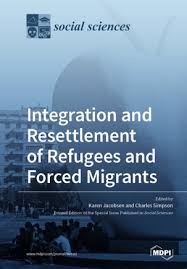Integration and Resettlement of Refugees and Forced Migrants – Karen Jacobsen and Charles Simpson (Eds.)

Editor(s): Karen Jacobsen and Charles Simpson
Publisher: Mdpi AG
Year of Publication: 2020
Print Length: 110 pages
Genre: Non-Fiction / Migration & Refugee Studies, Non-Fiction / Social Science
Area: France, Germany, Italy, Serbia, The United States of America (USA)
People: Syrian
Topic: Asylum & Asylum Seekers, Education, Integration, Linguistic, Migrants, Refugee Resettlement, Refugees & Forced Migration
Since 2017, the United States and Europe–among many other refugee-hosting countries–have made significant changes in their refugee policies. New visa restrictions, travel bans, and other regulations were imposed by national governments. At the local level, towns and cities responded in different ways: some resisted national policy by declaring themselves “sanctuary cities”, while others supported exclusionary policies. These different responses influenced refugees’ ability to settle and become integrated.
The Refugees in Towns (RIT) project at Tufts University explores local urban integration experiences, drawing on the knowledge and perspectives of refugees and citizens in towns around the world. Since 2017, more than 30 RIT case studies have deepened our local knowledge about the factors that enable or obstruct integration, and the ways in which migrants and hosts co-exist, adapt, and struggle with integration. In this Special Issue, seven articles explore urban integration in towns in Europe (Frankfurt-Rödelheim, Germany; Newcastle, UK; Ambertois, France; Italy’s cities; and Belgrade, Serbia) and in North America: Bhutanese refugee-hosting US cities, and Antigonish, Canada. The papers explore how refugees and citizens interact; the role of officials and politicians in enabling or obstructing integration; the social, economic, and cultural impact of migration; and the ways–inclusive or exclusive–locals have responded.
Table of Contents
About the Special Issue Editors
Preface to ”Integration and Resettlement of Refugees and Forced Migrants”
Martina Blank
“Wir Schaffen Das!”? Spatial Pitfalls of Neighborhood-Based Refugee Reception in
Germany—A Case Study of Frankfurt Rodelheim ̈
Matthias Flug and Jason Hussein
Integration in the Shadow of Austerity—Refugees in Newcastle upon Tyne
Teodora Jovanovic
Formal Education of Asylum Seeker Children in Belgrade, Serbia: Expanded Meaning of Social Inclusion
Rafik Arfaoui
The Asylum Seekers in Non-Metropolitan Areas in France: Between Temporary Integration and Leading to Autonomy. The Case of the Ambertois Territory
Rosella Bianco and Monica Ortiz Cobo
The Linguistic Integration of Refugees in Italy
Annie Taccolini Pannagio and Odessa Gonzalez Benson
“And Slowly, the Integration and the Growing and the Learning”: Nuanced Notions of Integration of Bhutanese Refugees in US Cities
Daniel B. Robinson, Ingrid M. Robinson, Vanessa Currie and Nathan Hall
The Syrian Canadian Sports Club: A Community-Based Participatory Action Research Project

Karen Jacobsen is the Henry J. Leir Professor in Global Migration at The Fletcher School of Law and Diplomacy at Tufts University,. Professor Jacobsen’s current research explores urban displacement and global migration, with a focus on the livelihoods and financial resilience of migrants and refugees, and on climate- and environment-related mobility. She directs the Refugees in Towns Project at the Leir Institute for Migration and Human Security. In 2013-2014, she was on leave from Tufts, leading the Joint IDP Profiling Service (JIPS) at United Nations in Geneva. From 2000-2005, she directed the Alchemy Project, which explored the use of microfinance to support people in refugee camps.
Source: https://fletcher.tufts.edu/people/faculty/karen-jacobsen
More from Karen Jacobsen in this library, click here.

Charles Simpson is an internationally-known author, Bible teacher, and pastor, serving in ministry since 1955. His humor and story-telling often carry a deeper message that is prophetic in its timeliness and timelessness.
Source: https://csmpublishing.org/about/leadership/
More from Charles Simpson in this library, click here.
